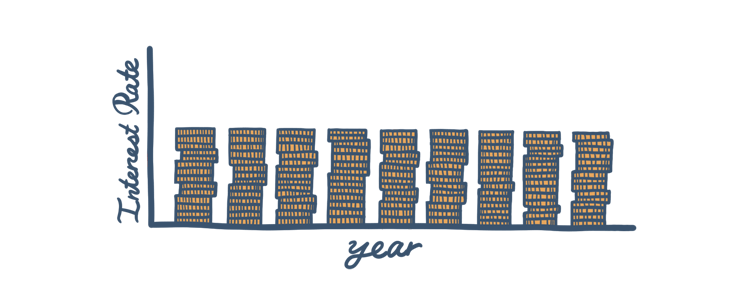Fixed Rate Mortgage

As the name would suggest, the interest rate on a fixed rate mortgage stays the same throughout the life of the loan, and consequently, so do the minimum monthly payments.
The FHA’s fixed rate mortgages are a popular option for many homebuyers as they come with the same flexible guidelines as other FHA programs, namely the 3.5% down payment requirement and 580 minimum credit score. The fixed rate mortgages have either 15 or 30-year terms. While 30-year terms are the most popular, 15-year fixed rate mortgages typically have lower interest rates with higher monthly payments, but more of the money goes toward the principal every month.
Eligibility
In order to qualify for an FHA fixed rate mortgages, it’s important you know the basic requirements:
- Your debt-to-income ratio must fall at or under the FHA’s maximum qualifying ratio of 43%.
- You must have a credit score of at least 500.
- You qualify for a 3.5% down payment if your credit score is 580 or higher, or a 10% down payment if your credit score is between 500-579.
- The house you buy must be a 1- to 4-unit structure that serves as your primary residence and meets the FHA’s minimum property requirements.
The Pros
A fixed rate loan can be a surefire choice for many borrowers because of the certainty it comes with.
- A fixed rate loan means no surprises. You know exactly what your monthly payment is going to be for the life of the loan, making it easier for you to budget your income.
- Borrowers with fixed rate mortgages are protected from the uncertainty of a fluctuating market. Even if interest rates skyrocket, your rate is locked in for the entire term.
- The fixed rates make it easier to shop around for loans, because you can simply calculate your monthly payments and make the best choice.
The Cons
The inflexibility of fixed rate mortgages may not work out for all homebuyers.
- With fixed rate loans, timing can work against you. You may feel you’re getting a low rate at closing time, but a few months down the line the rates may drop further.
- Refinancing for a lower rate may be expensive and ultimately cost you more in the long run.
- Fixed rate mortgages generally have higher interest rates than ARMs, and if you end up selling or refinancing in the first few years, your interest payments would have to be higher.

FHA Loan Articles
August 10, 2023FHA loans have specific rules and requirements for borrowers who have filed for bankruptcy. The guidelines can change over time, so it's essential to consult with a qualified lender or FHA-approved counselor for the most up-to-date information.
August 3, 2023FHA loans are primarily designed to help individuals and families purchase homes for use as their primary residences. Rules for these loans generally discourage their use for investment properties or rentals. However, there are exceptions that come with strict rules.
July 29, 2023One crucial aspect of FHA loans that borrowers need to understand thoroughly is debt ratios. In this article, we look at how they can impact your ability to secure financing for your dream home. Debt ratios help lenders understand a borrower's creditworthiness and any risks associated with the loan.
July 21, 2023Investing in a multi-unit property can be an excellent way to build wealth through rental income and property appreciation. FHA multi-unit property loans make this opportunity more accessible to a broader range of individuals. You must occupy a unit as your primary residence within 60 days of closing the loan.
July 15, 2023To qualify for an FHA loan, you must meet certain employment requirements. In this article, we'll dig into the FHA loan employment requirements so that you can understand what's needed to get approved for this type of mortgage.
July 7, 2023Manufactured homes, sometimes referred to as mobile or modular homes, are factory-built residences designed to meet or exceed national building codes set HUD. They offer cost savings and energy efficiency, making them an attractive housing option for many Americans.








